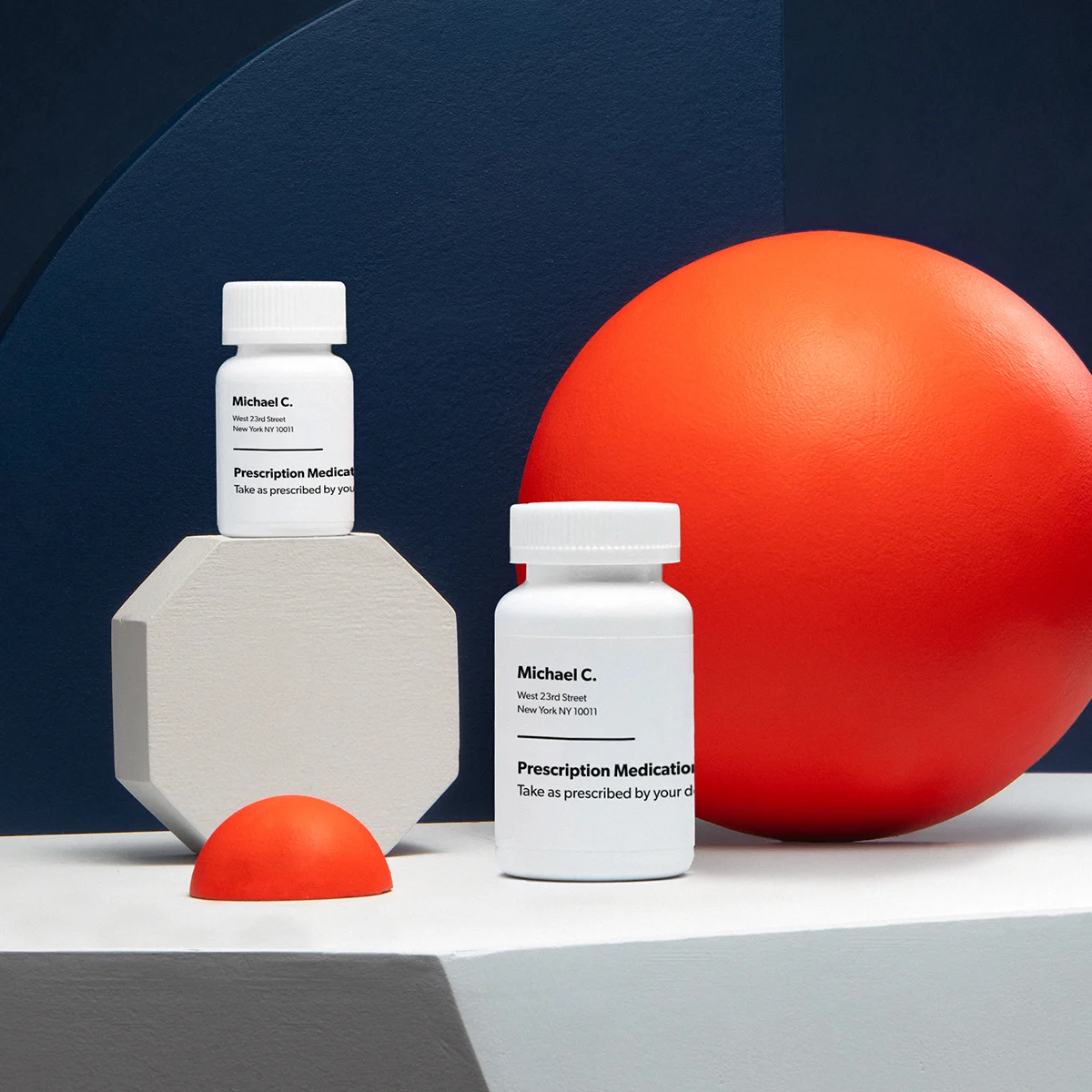Key takeaways
The most common treatment for genital herpes is oral antiviral medication like valacyclovir (generic Valtrex) or acyclovir
Antiviral medication can help shorten an outbreak's duration and reduce the risk of transmission to others
The earlier you take the medications during an outbreak, the better they work.
Here's what we'll cover
Here's what we'll cover
Here's what we'll cover
Key takeaways
The most common treatment for genital herpes is oral antiviral medication like valacyclovir (generic Valtrex) or acyclovir
Antiviral medication can help shorten an outbreak's duration and reduce the risk of transmission to others
The earlier you take the medications during an outbreak, the better they work.
If you have genital herpes, you’re probably looking for relief as soon as possible. While genital herpes is not curable, medication can ease your symptoms and help prevent future outbreaks.
The three main treatment options for genital herpes include the antiviral medications valacyclovir, acyclovir, and famciclovir. Let’s look at what you need to know about getting these medications, treating an outbreak, and preventing outbreaks from happening in the future.
What medications are available for genital herpes?
If you are experiencing an active outbreak of genital herpes — including painful, inflamed bumps or blisters on your genitals and surrounding areas — or notice swelling, irritation, or burning during urination, your healthcare provider will recommend prompt treatment with antiviral medications.
Genital herpes is caused by herpes simplex virus 2 (HSV-2), and in some cases, also by herpes simplex virus 1 (HSV-1). Antiviral medications reduce the virus’s ability to multiply in your body, which can help accelerate the healing process by 1–2 days, lower your risk of transmitting herpes to your sex partners, and prevent future outbreaks. Taken early enough during an outbreak, these drugs can even prevent herpes from progressing into a full-blown outbreak with ulcers.
There are three main treatment options for genital herpes. These include the oral antiviral medications valacyclovir, acyclovir, and famciclovir.
Valacyclovir (brand name Valtrex) is usually the first-line treatment for genital herpes. Side effects of valacyclovir can include nausea, headache, joint pain, rash, and dizziness.
Acyclovir (brand name Zovirax) was developed before valacyclovir and is highly effective at treating genital herpes. However, it has a low oral bioavailability (how much of the drug gets absorbed by the body), so you need to take it more often during the day. That’s why drug makers developed valacyclovir, which has a higher bioavailability, allowing it to be just as effective as acyclovir, but in fewer doses. Similar to valacyclovir, side effects of acyclovir can include nausea, headache, joint pain, rash, and dizziness.
Famciclovir (brand name Famvir) is another effective treatment for genital herpes. It has the highest bioavailability of the three, as well as a longer half-life than acyclovir. Common side effects of famciclovir include headaches, diarrhea, nausea, and abdominal pain.
Your healthcare provider may recommend different dosing regimens depending on whether this is your first outbreak of genital herpes, or you’ve had an outbreak before. Typically, the first symptomatic outbreak of genital herpes is the most intense and lasts the longest, with recurrent outbreaks resolving more quickly and sometimes with fewer symptoms.
During your first outbreak of genital herpes, your healthcare provider may advise you to take the medication 3 times per day, for a period of 7–10 days. During a subsequent outbreak, you may only need to take the medication 1–2 times per day, for a period of 1–5 days. Whether this is your first outbreak or not, early treatment is important. The sooner you get treatment, the faster your symptoms will resolve, and the lower your risk of spreading the virus to someone else. Plus, it can be more challenging for healthcare providers to diagnose genital herpes once your ulcers start to heal with the current available testing options.
How to get genital herpes medication
The antiviral medications that treat genital herpes are all prescription drugs, so you’ll need a prescription from a licensed healthcare professional to get them. Make an appointment with your healthcare provider as soon as you notice symptoms.
The telltale signs of a genital herpes outbreak are red, inflamed bumps on the skin of your genitals, buttocks, upper thighs, and perineum (the skin between your anus and vulva or scrotum), which may show up 4–7 days after you have sex (in the case of your first outbreak). Typically, these bumps will be clustered together and may be painful to touch, especially as they transform from reddish bumps into pustules, sores, or ulcers. You may also notice lower back pain, or genital itchiness, burning, or tingling in the hours to days before any bumps or lesions appear.
Additional symptoms of genital herpes may include:
Painful urination
Swollen lymph nodes that are painful to touch
Flu-like symptoms, such as fever, headache, muscle aches, or fatigue
Men with genital herpes may also experience proctitis, an inflammation of the rectum that causes rectal pain, bleeding, or discharge, while women may experience a swelling of the vulva or cervicitis, an inflammation of the cervix that causes pelvic pain, pus-like vaginal discharge, or bleeding after sex or between periods.
If this is your first outbreak, your healthcare provider will take a swab of the herpes lesions and test it to determine whether you have HSV-1 or HSV-2. They may also perform a blood or urine test to rule out other STIs, such as gonorrhea, chlamydia, and HIV. Once your doctor gives you a prescription for herpes antiviral therapy, you can fill your prescription at your local pharmacy. You can also get herpes medication from a licensed healthcare provider through Ro.
How can you treat a genital herpes outbreak?
To treat genital herpes, your healthcare provider will tell you which antiviral medication to take and at what dosage. Always follow your health provider’s advice when treating a genital herpes outbreak, but common dosage regimens may look like the following.
For a first outbreak of genital herpes:
Valacyclovir 1000 mg, twice per day, for 7–10 days
Acyclovir 400 mg, three times per day, for 7–10 days
Famciclovir 250 mg, three times per day, for 7–10 days
For recurrent outbreaks of genital herpes:
Valacyclovir 500 mg, twice per day, for 3 days
Valacyclovir 1000 mg, once per day, for 5 days
Acyclovir 800 mg, twice per day, for 5 days
Acyclovir 800 mg, three times per day, for 2 days
Famciclovir 125 mg, twice per day, for 5 days
Famciclovir 1000 mg, twice per day, for 1 day
Famciclovir 500 mg, once on day 1, followed by 250 mg twice per day for 2 more days
The dosage schedule your health provider recommends can also vary depending on your symptoms and how soon into the outbreak you can begin treatment.
In addition to antiviral therapy, you can take other measures to ease your herpes symptoms.
Gently washing your sores with soap and water, and then patting them dry, can also help them heal. Do not bandage your sores or pick at them, which can slow down the healing process and increase your risk of an infection. Do not put creams or lotions on the sores either, unless directed by your health provider. Finally, wear loose-fitting cotton underwear and avoid tight clothing until your herpes heal.
How can you prevent a genital herpes outbreak?
Some people may opt to take antiviral medication on an ongoing basis if they have more frequent or severe outbreaks, or if they have regular sex partners they want to risk giving herpes to. This form of treatment is called suppressive therapy. Below are some typical dosage schedules for ongoing treatment of genital herpes:
Valacyclovir 500 mg or 1000 mg, once per day
Acyclovir 400 mg, twice per day
Famciclovir 250 mg, twice per day
While it is not known what exactly causes a herpes outbreak, certain triggers have been identified, including experiencing a fever, exposure to UV light, menstruation, stress, or trauma. Making the following lifestyle changes to avoid these triggers may help prevent future outbreaks:
Sleeping and eating well to keep your immune system strong.
Managing your stress levels
Minimizing exposure to UV light and extreme weather by using sunscreen and staying indoors
How to know if you’re going to have an outbreak
There are some warning signs that you may be about to have a genital herpes outbreak. These “prodromal” symptoms may show up hours to days before the bumps or blisters develop and may include:
Tingling or pain in your lower back or sacrum
Tingling, itching, or burning around the genitals
Painful or difficult urination (dysuria)
Abnormal discharge
If you notice these symptoms and don’t have medication on hand, contact your health provider. Also inform your sex partner and avoid vaginal, anal, and oral sex until your outbreak resolves. Wash your hands with soap and water after touching your genitals.
Once your outbreak resolves, you can go back to having sex (always do so with condoms as you can still transmit herpes even when you are asymptomatic), and share your status with your sex partners so they can make an informed decision.
DISCLAIMER
If you have any medical questions or concerns, please talk to your healthcare provider. The articles on Health Guide are underpinned by peer-reviewed research and information drawn from medical societies and governmental agencies. However, they are not a substitute for professional medical advice, diagnosis, or treatment.
References
Groves, M. J. (2016). Genital Herpes: A Review. American Family Physician, 93(11), 928–934. Retrieved from https://www.aafp.org/pubs/afp/issues/2016/0601/p928.html
Heslop, R., Roberts, H., Flower, D., et al. (2016). Interventions for men and women with their first episode of genital herpes. The Cochrane Database of Systematic Reviews, 2016(8), CD010684. doi:10.1002/14651858.CD010684.pub2. Retrieved from https://www.ncbi.nlm.nih.gov/pmc/articles/PMC8502075/
Hollier, L. M. & Eppes, C. (2015). Genital herpes: oral antiviral treatments. BMJ Clinical Evidence, 2015, 1603. Retrieved from https://www.ncbi.nlm.nih.gov/pmc/articles/PMC4389798/
Johnston, C. (2022). Diagnosis and Management of Genital Herpes: Key Questions and Review of the Evidence for the 2021 Centers for Disease Control and Prevention Sexually Transmitted Infections Treatment Guidelines. Clinical Infectious Diseases: An Official Publication of the Infectious Diseases Society of America, 74(Suppl_2), S134–S143. doi:10.1093/cid/ciab1056. Retrieved from https://academic.oup.com/cid/article/74/Supplement_2/S134/6567958?login=false
Mathew, Jr., J. & Sapra, A. (2023). Herpes Simplex Type 2. StatPearls. Retrieved Oct. 25, 2023 from https://www.ncbi.nlm.nih.gov/books/NBK554427/
MedlinePlus. (2022). Genital herpes - self-care. Retrieved Oct. 26, 2023 from https://medlineplus.gov/ency/patientinstructions/000653.htm
Miserocchi, E., Modorati, G., Galli, L., et al. (2007). Efficacy of valacyclovir vs acyclovir for the prevention of recurrent herpes simplex virus eye disease: a pilot study. American Journal of Ophthalmology, 144(4), 547–551. doi:10.1016/j.ajo.2007.06.001. Retrieved from https://pubmed.ncbi.nlm.nih.gov/17692271/
Modi, S., Van, L., Gewirtzman, A., et al. (2008). Single-day treatment for orolabial and genital herpes: a brief review of pathogenesis and pharmacology. Therapeutics and Clinical Risk Management, 4(2), 409–417. doi:10.2147/tcrm.s1664. Retrieved from https://www.ncbi.nlm.nih.gov/pmc/articles/PMC2504076/
Sauerbrei, A. (2016). Herpes Genitalis: Diagnosis, Treatment and Prevention. Geburtshilfe und Frauenheilkunde, 76(12), 1310–1317. doi:10.1055/s-0042-116494. Retrieved from https://www.ncbi.nlm.nih.gov/pmc/articles/PMC5177552/
Spruance, S. L., Jones, T. M., Blatter, M. M., et al. (2003). High-dose, short-duration, early valacyclovir therapy for episodic treatment of cold sores: results of two randomized, placebo-controlled, multicenter studies. Antimicrobial Agents and Chemotherapy, 47(3), 1072–1080. doi:10.1128/AAC.47.3.1072-1080.2003. Retrieved from https://www.ncbi.nlm.nih.gov/pmc/articles/PMC149313/
Zhu, S. & Viejo-Borbolla, A. (2021). Pathogenesis and virulence of herpes simplex virus. Virulence, 12(1), 2670–2702. doi:10.1080/21505594.2021.1982373. Retrieved from https://www.ncbi.nlm.nih.gov/pmc/articles/PMC8923070/










